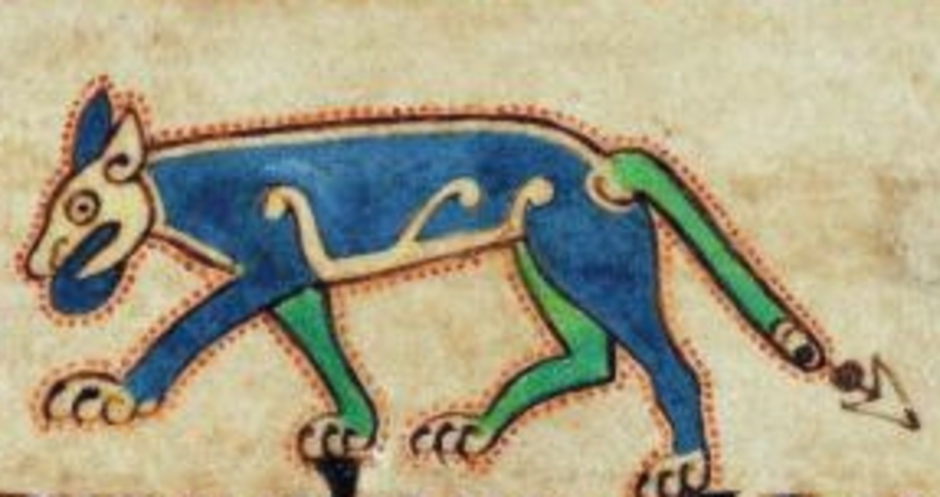
The Importance of the Irish Language in Genealogical Research
The Irish literary tradition in the Irish Language enables researchers to examine genealogies which are far older than Ireland's records in English. Some Irish genealogies are now being proven accurate by DNA analysis as far back as the 4th century A.D.
The Importance of the Irish Language in [...]
MP3 audio file [5.5 MB]
Did you lose something?
Does it really annoy you when you lose something? Say, a huge part of your family's history? If so, consider this for a moment.
Also known as Gaeilge or Irish Gaelic, the Irish Language is the living warehouse of over 2,500 years of Irish and Celtic oral history, oral genealogy, law, myth, religion, poetic art, song, epic tales, saga, and science. Do you want to know how your ancestors lived and thought? Their entire, unique, world-view? As characterized by the Celtic scholar Kenneth Hurlstone Jackson, the Irish Language is your “window on the Iron Age”.
The Written Record
“Archaic Irish” was first written in the form of short genealogies on Ogham stones about the 3rd or 4th Century after Christ. The earliest surviving manuscript containing writing in Irish may be the 7th century Cathach of St. Columba. Irish history and genealogy were written on a contemporary basis by the 7th century and some have recently been proven by DNA analysis to be accurate as far back as approximately 350 A.D. (Here I reference the recent research by Trinity College Dublin of the DNA of the Connachta, including the Uí Néill.) In other words, the Irish Language is the direct written link to all the elements of native Irish learning and culture during the Early Christian, Medieval, Renaissance, and Early Modern periods. Using English language records in Ireland to go back 200 years in your family's history is a wonderful accomplishment. But imagine going back as much as 1650 years in your family's history using Irish Language records.
The Broken Link
If this were an article about Pierre le Deuxieme, Henri le Dauphin, or other nobility of France, you would be confused, if not appalled, if I were to spell their names as Pea-Air Lih Doozy-Am and Harry The Porpoise. Yet this kind of nonsense is exactly what happened to Irish surnames and genealogies in the 19th century. Besides making our ancestors sound like aliens or mob hitmen, absurdities like this obviously break the link to the past, insult our intelligence, and leave us guessing about who we're actually talking about. If you’ve read O’Hart's Pedigrees and tried to cross-reference them to any of the Annals, you know what I mean.
Today, without research or knowledge of Irish, who would guess that the obviously English name ‘Cannon’ is, in south Connacht, actually a cover-name for Ó Canáin ('Grandson of Little Wolf Cub')? Or that ‘Ward’ is actually a partial phonetic for Mac an Bháird (‘Son of the Praise-Poet’), the name of three distinguished literary families? Or that the obviously English name of ‘Clark’ is a cover-name for Ó Cléirigh, the respected sloinne of hereditary historians?
In fact, from our ancestors' point of view, all the anglicized Irish surnames we use today are either poor translations, misspelled, or at best, rough phonetic attempts at the real thing.
Re-Forging the Link
Happily, the days of re-writing the entire Irish language phonetically in English in order to satisfy a foreign imperium are over. The great Irish seanchadh (combination of historian, jurist and genealogist) Dubhaltach Mac Fhirbhisigh is not “Dudley Forbes”. The great Irish historians Seathrún Céitinn and Cú Choigcríche Ó Cléirigh are not “Geoffrey Keating” and “Peregrine O'Clery”. Even the Irish government has finally begun to re-claim the ancient placenames of Ireland, thereby undoing the damage to history, culture, and common sense inflicted by the Ordnance Surveys of the 1830s and 1840s which re-wrote the entire map of Ireland in gibberish. The ancient 'Fortress of Ó Cúis' is again recognized on Irish maps as Daingean Uí Chúis. It always deserved better than a silly name like “Dingle”.
In other words, the Irish Language is again restoring people and place, reference and context, to those who are researching the history, law, and genealogy of Ireland.
How to get in on it
If you don't already know Irish, don't be discouraged. You can learn. Certainly, Irish phonetics are radically different from English phonetics, but so are the phonetics of Italian, Russian, Chinese, Japanese, Arabic, Hindi, and every other language. Excellent self-teaching tools, such as Rosetta Stone and Duolingo, are now available for all these languages, including Irish. You can even learn the Irish Language over the internet, no matter where you are in the world.
Does it really annoy you when you lose something? Then take it back. Learn Irish.
Copyright © 2014 by Gerald A. John Kelly
All Rights Reserved - No reproduction without written permission of the author

